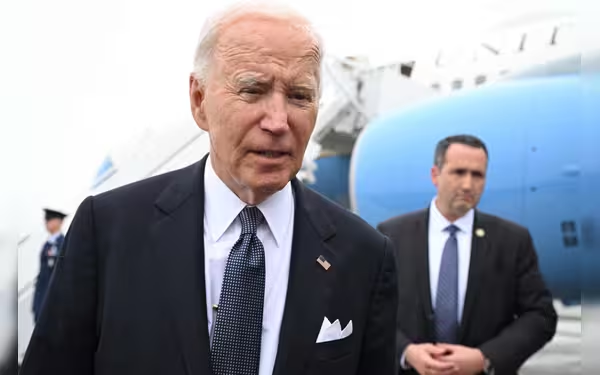Saturday, November 16, 2024 03:21 PM
Biden Orders US Military Adjustments Following Israel's Airstrikes
- Biden directs Pentagon to modify US military presence.
- US embassies to implement protective measures.
- Israel's airstrikes raise concerns over regional stability.
 Image Credits: arabnewspk
Image Credits: arabnewspkPresident Biden orders military adjustments in response to Israel's airstrikes, aiming to enhance US presence and regional stability.
In recent days, tensions in the Middle East have escalated significantly, particularly following Israel's military actions in Lebanon. The situation has prompted a response from the United States, as President Joe Biden has ordered adjustments to US forces in the region. This decision comes in light of Israel's airstrikes on Beirut, which specifically targeted Hezbollah's headquarters, raising concerns about the potential for further conflict.
The White House announced that President Biden has directed the Pentagon to evaluate and modify the US military presence in the Middle East as necessary. The aim is to enhance deterrence, ensure the protection of US forces, and support a wide range of American objectives in the area. This proactive approach underscores the US commitment to maintaining stability in a region that has long been fraught with tension.
In addition to military adjustments, President Biden has instructed US embassies in the region to implement all appropriate protective measures. This directive highlights the administration's focus on safeguarding American personnel and interests amid rising hostilities.
While on a trip to his beach house in Delaware, President Biden received multiple briefings from his national security team regarding the unfolding situation. He emphasized that the United States had no prior knowledge of Israel's military actions, stating, "We’re gathering information." This assertion was echoed by Defense Secretary Lloyd Austin, who confirmed that the US was not informed in advance of the strikes.
Reports from Israeli media indicate that the airstrikes were aimed at Hezbollah leader Hassan Nasrallah. However, a source close to Hezbollah has claimed that Nasrallah is "fine," suggesting that the operation may not have achieved its intended objective. This development raises questions about the effectiveness of such military actions and their potential repercussions on regional stability.
The current situation in the Middle East serves as a reminder of the complexities involved in international relations and military engagements. As the US adjusts its military posture, it is crucial for all parties involved to seek diplomatic solutions to prevent further escalation. The world watches closely, hoping for a resolution that prioritizes peace and security for all nations in the region.













